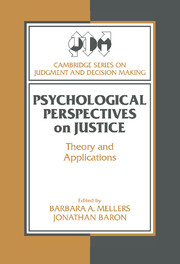Book contents
- Frontmatter
- Contents
- Series preface
- Contributors
- Part I Introduction
- Part II Psychological perspectives
- Equality as a decision heuristic
- Two insights occasioned by attempts to pin down the equity formula
- Judgments of distributive justice
- Part III Economic perspectives
- Part IV Variations in perspectives on justice
- Part V Policy perspectives
- Part VI Conclusion
- Name index
- Subject index
Two insights occasioned by attempts to pin down the equity formula
Published online by Cambridge University Press: 24 October 2009
- Frontmatter
- Contents
- Series preface
- Contributors
- Part I Introduction
- Part II Psychological perspectives
- Equality as a decision heuristic
- Two insights occasioned by attempts to pin down the equity formula
- Judgments of distributive justice
- Part III Economic perspectives
- Part IV Variations in perspectives on justice
- Part V Policy perspectives
- Part VI Conclusion
- Name index
- Subject index
Summary
This chapter is a defense (rationalization?) of research on the equity formula – that is, on the nature of the relationship that holds between inputs and fair outcomes. The defense consists primarily of pointing out substantive insights into the processes governing subjects' behavior when asked to allocate group outcomes fairly that have resulted from relatively recent research on what most textbook authors and most equity researchers consider the dry and at best tangential topic of the equity formula. I'll focus on two such insights:
The tenuous nature of the “equality norm”, as demonstrated by its virtual disappearance when subjects are induced to be consistent in their allocation of outcomes and of outcome–input differences.
Dependence of the criteria that subjects use for judging the fairness of an allocation scheme on the match between the units in which inputs and outcomes are measured – this particular insight occasioned by attempts to specify the conditions under which nonlinearity (à la Mellers, 1982) creeps into the equity formula.
What's an equity formula?
Readers of this book are unlikely to need convincing that equity considerations arise in a very wide range of social settings: education, economics, business, intimate, and so on. You may be less familiar with the notion of an equity formula. An equity formula is simply an algebraic expression of the functional relationship between outcomes and inputs that holds when observers deem the social exchange among the participants to be (have been) a fair one.
- Type
- Chapter
- Information
- Psychological Perspectives on JusticeTheory and Applications, pp. 32 - 54Publisher: Cambridge University PressPrint publication year: 1993
- 2
- Cited by

